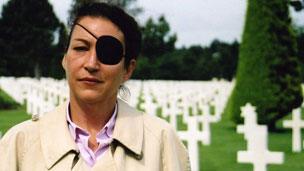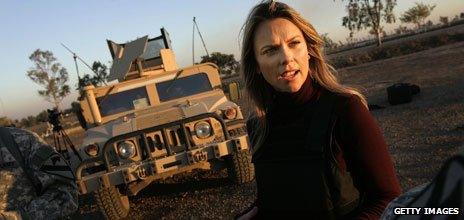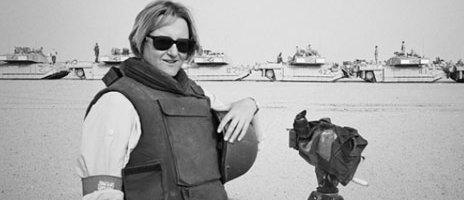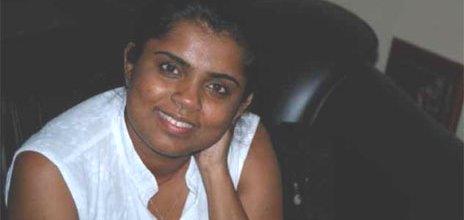Tales of survival from the front line
- Published

Marie Colvin was killed in the Syrian city of Homs
To mark International Women's Day on Thursday, a new book outlines some uplifting stories of survival in some of the world's most dangerous regions.
Forty women journalists have contributed to No Woman's Land - On the Frontlines with Female Reporters.
Between them, they've covered conflict, disasters, corruption and civil unrest and come from more than a dozen countries.
The book has been published by the International News Safety Institute and was inspired by the attack on CBS News correspondent Lara Logan in Cairo's Tahrir Square last year.
Here is a selection of their contributions.
Begging for my life

I remember begging for my life. I remember giving up. I remember fighting back. I remember accepting my death. And I remember clearly, making a decision to go down fighting with my last breath. I remember everything.
And I now know how easy it is to die. Not in an intellectual way, more of a visceral, carnal understanding that obliterates all light. I know what fear really is, what it feels like when it seeps into the fibre of your being and like your skin, you can't tear it off or be free of it.
Lara Logan of CBS News recalls her ordeal in Tahrir Square
I kneed him in the groin
After coming back from Afghanistan and Iraq, I decided to start doing kung fu and martial arts just so I could easily defend myself. I decided to do that because there was one scenario, which my colleagues still bring up, when we were covering the first day of school in Kabul. It was in 2002 and President Karzai was giving a speech. There was a huge crowd of supporters in the street: it was supposed to be this rewarding experience of seeing these little girls going to school for the first time, and there was a guy behind me who just would not stop grabbing my butt. I tried pushing him off, and finally, I just grabbed his shoulder and kneed him in the groin. He looked completely appalled - and immediately stopped.
Bay Fang, formerly of Chicago Tribune and US News and World Report magazine
Bikini violence

It is frequently surmised that much of the danger to female journalists comes from groups of men, but the only time I have been physically attacked was by a group of bikini-clad prostitutes hurling hot tea and stones at me while I was doing research for a film on prostitution on the Reeperbahn in Germany. This taught me a valuable lesson about camouflage and blending in.
Janet Harris, ex-BBC World Service and BBC documentaries
A trunk full of AK-47s
I will admit that I never encountered any sexual assault while serving for 15 years overseas in many lawless and broken countries. I was lucky. Many of my female colleagues did.
There were risks I took driving at midnight through Natal en route to an Inkatha conference when Mangosuthu Buthelezi challenged the ANC at the end of apartheid in South Africa.
It turned out later that my escort was Inkatha's main gunrunner. And the vehicle we were driving was packed with AK-47s in the trunk. Had the South African authorities found us, it is not clear what would have happened.
Jennifer Griffin, Fox News
'Come for dinner'

The challenge of being a female financial journalist is enormous. As journalists, women can't go to some areas that male colleagues can, because they say it is unsafe for women. There is also a lot of prejudice when it comes to female journalists. People think we can charm men to get our stories, and men, especially business tycoons, can be very suave.
They say things like, "Why don't you come to lunch? Why don't you come to dinner? Why don't you come for cocktails?' - and they think we'll fall for it, and so be under obligation, as a lot of journalists still are.
Duruthu Edirimuni Chandrasekera, Business Times, Sri Lanka
They grabbed me like spiders
The air became heavy on the avenue leading from Tahrir Square to the 6th of October Bridge, where we had to walk between a military tank and a stage. Men and women gathered there to listen to Shadia's song, "My Love Egypt". In the middle of the crowd, I suddenly felt hands on the intimate parts of my body - they grabbed me like spiders. I was paralyzed, but when I realised that this was not a one-off incident and that many people wanted to touch me, I felt vulnerable and became angry. Instinctively, I wanted to smack the molesters - but they disappeared quickly. Touching and pulling went on for some minutes until people around me started noticing what was happening. My Egyptian friends closed the space around me and gave me precise instructions as they pulled me out: to finger-point at the people who were molesting me.
Agnes Rajacic, freelance journalist
On the road in Darfur
The only time I've ever felt in fear for my life was in Darfur in 2005, and not because of the warring militias, but because of a thoroughly bad driver in a vehicle which shouldn't have been on any road, let alone one of the most dangerous roads in Darfur.
I don't think I've ever been in a situation where it's been too dangerous for me to get the full story. Don't do anything silly, of course but ask yourself "Why am I doing these stories?"
Ann McFerran, who in her 40-year career has written for the Times, Sunday Times, Telegraph and Guardian